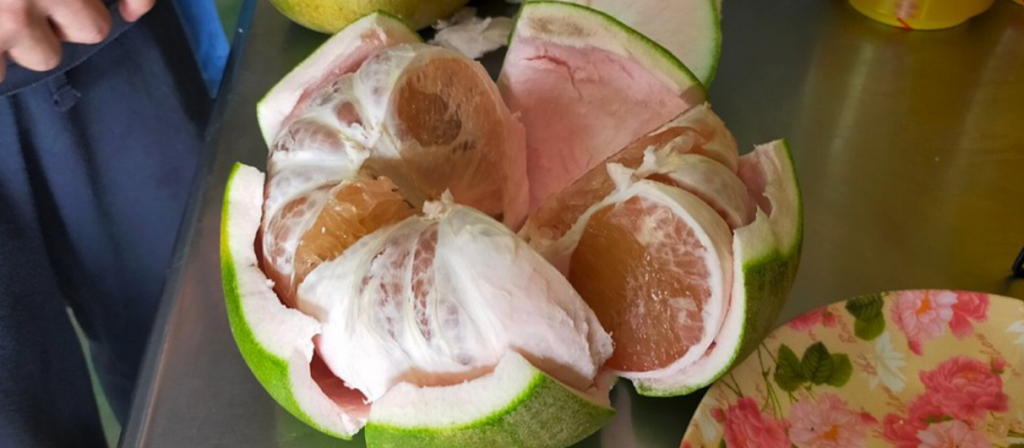
Pomelo (Citrus maxima or Citrus grandis) is the largest citrus fruit in the world, often weighing between 1-2 kilograms (2.2-4.4 pounds), and sometimes even more. Known for its thick, spongy rind and sweet, slightly tart flesh, pomelo is revered for its unique taste and numerous health benefits. This fruit has significant cultural importance, especially in South-East Asia, where it holds symbolic value in various traditions and festivals.

Native Origin
Pomelo is native to South-East Asia, particularly regions of Malaysia, Indonesia, and southern Thailand. Historical records suggest that pomelo has been cultivated for thousands of years, spreading across Asia and later being introduced to other parts of the world through trade and exploration. Due to its ancient origins, pomelo is often referred to as the ‘Ancestor’ or ‘Grandfather’ of modern citrus fruits, as it is one of the original species from which other citrus fruits, such as oranges and grapefruits, have been derived through hybridization.
Taste Profile
The taste of pomelo can vary depending on the variety and ripeness. Generally, it has a mild, sweet,
and slightly tangy flavour, often compared to a milder, less bitter grapefruit. The flesh can range
from pale yellow to deep pink and has a juicy, somewhat firm texture. Unlike grapefruits, pomelos
are not as acidic, making them a pleasant and refreshing snack.

Health Benefits
Pomelo is packed with essential nutrients and offers several health benefits:
- Rich in Vitamin C: One pomelo fruit is packed with several days’ worth of the recommended daily intake of vitamin C, a powerful antioxidant and immune system booster.
- High in Dietary Fibre: Aids digestion and prevents constipation.
- Antioxidant Properties: Contains flavonoids and other antioxidants that help reduce inflammation and oxidative stress.
- Heart Health: Helps regulate blood pressure due to its potassium content. There is also some evidence that eating pomelo and drinking pomelo juice at night can help reduce blood pressure.
- Weight Management: Low in calories and high in fibre, making it an ideal fruit for weight loss.
- Rich in Nutrients: Besides vitamin C, it contains copper, fibre, potassium, and other essential
- vitamins and minerals.
Symbolic Significance in Chinese Culture
In Chinese culture, pomelo is often eaten during the Mid-Autumn Festival and other important occasions. It symbolizes prosperity, abundance, and good fortune. The word for pomelo (柚, yòu) sounds similar to the word for ‘blessing’ (佑, yòu), making it an auspicious fruit. During festive periods, families may place pomelos as offerings at altars or use the thick rind to craft decorative items.
Names in Different Countries
- Malaysia: Limau Besar, Limau Betawi, Limau Serdadu
- Indonesia: Jeruk Bali
- Thailand: Som-O
- Philippines: Suha or Lukban
- Vietnam: Bưởi
- China: Youzi (柚子)
The Best Pomelo: Ipoh’s Claim
Ipoh, specifically the Tambun Valley in Malaysia, is famous for producing some of the best pomelos in the world [Ipoh – capital of Perak state]. The valley’s unique geographical conditions are a key factor. The limestone hills surrounding the Tambun Valley farms provide a rich supply of essential minerals, such as calcium, which significantly benefit pomelo trees. Additionally, the soil in Tambun is known for its high mineral content, while the underground water, also rich in minerals, contributes to the fruit’s unparalleled sweetness and juiciness. This combination of ideal growing conditions has made Tambun pomelos highly sought after, and visitors to Ipoh often make it a point to buy this local delicacy.


Other Interesting Facts
- Pomelos are often used in traditional medicine to treat coughs and digestive issues.
- The peel can be candied or used to make marmalade.
- The fruit’s thick rind is sometimes used to make eco-friendly cleaning agents.
- In Thai cuisine, pomelo salads (Yam Som-O) are a popular dish, blending the fruit’s sweetness with savoury and spicy ingredients. Watch how to make Yam Som-O.
Final Thoughts
Pomelo is more than just a giant citrus fruit. It carries cultural significance, boasts an array of health benefits, and has a delightful taste profile that makes it a favourite in many Asian countries. Whether enjoyed fresh, in salads, or as part of a traditional festival, pomelo continues to be celebrated worldwide.
You could try a Pomelo, Durian, Mangosteen, Snake Fruit, or Jackfruit during a YPT Tour of South-East Asia.





